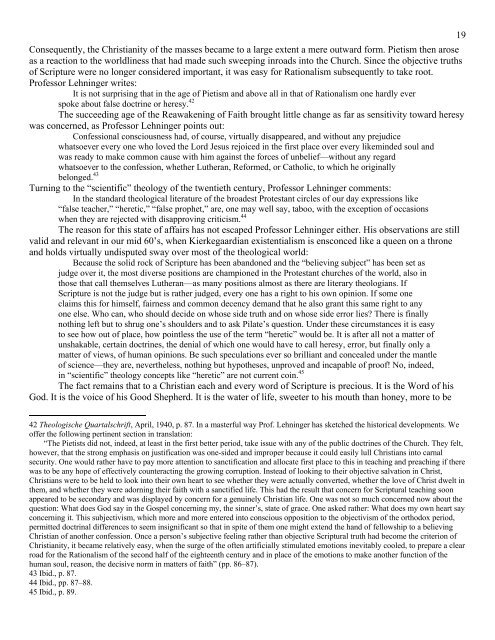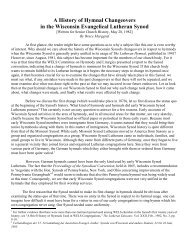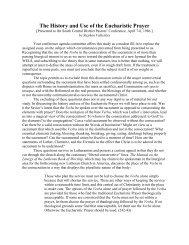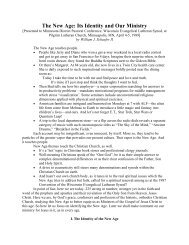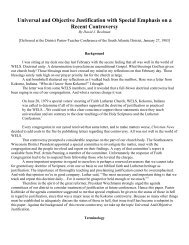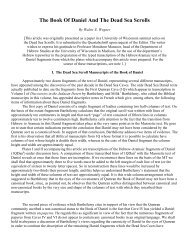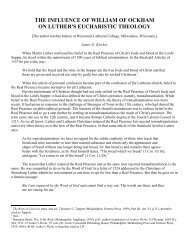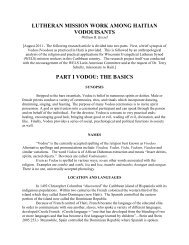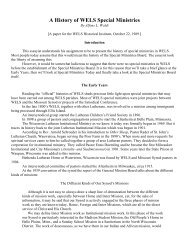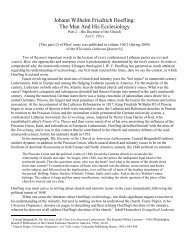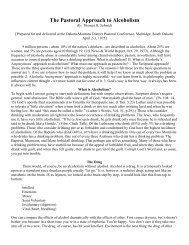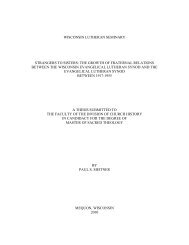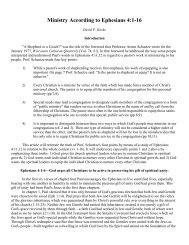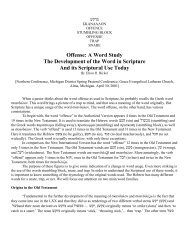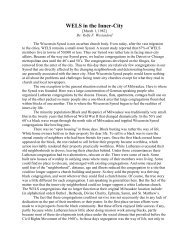What Is Heresy? - Wisconsin Lutheran Seminary Library: Essays
What Is Heresy? - Wisconsin Lutheran Seminary Library: Essays
What Is Heresy? - Wisconsin Lutheran Seminary Library: Essays
You also want an ePaper? Increase the reach of your titles
YUMPU automatically turns print PDFs into web optimized ePapers that Google loves.
19<br />
Consequently, the Christianity of the masses became to a large extent a mere outward form. Pietism then arose<br />
as a reaction to the worldliness that had made such sweeping inroads into the Church. Since the objective truths<br />
of Scripture were no longer considered important, it was easy for Rationalism subsequently to take root.<br />
Professor Lehninger writes:<br />
It is not surprising that in the age of Pietism and above all in that of Rationalism one hardly ever<br />
spoke about false doctrine or heresy. 42<br />
The succeeding age of the Reawakening of Faith brought little change as far as sensitivity toward heresy<br />
was concerned, as Professor Lehninger points out:<br />
Confessional consciousness had, of course, virtually disappeared, and without any prejudice<br />
whatsoever every one who loved the Lord Jesus rejoiced in the first place over every likeminded soul and<br />
was ready to make common cause with him against the forces of unbelief—without any regard<br />
whatsoever to the confession, whether <strong>Lutheran</strong>, Reformed, or Catholic, to which he originally<br />
belonged. 43<br />
Turning to the “scientific” theology of the twentieth century, Professor Lehninger comments:<br />
In the standard theological literature of the broadest Protestant circles of our day expressions like<br />
“false teacher,” “heretic,” “false prophet,” are, one may well say, taboo, with the exception of occasions<br />
when they are rejected with disapproving criticism. 44<br />
The reason for this state of affairs has not escaped Professor Lehninger either. His observations are still<br />
valid and relevant in our mid 60’s, when Kierkegaardian existentialism is ensconced like a queen on a throne<br />
and holds virtually undisputed sway over most of the theological world:<br />
Because the solid rock of Scripture has been abandoned and the “believing subject” has been set as<br />
judge over it, the most diverse positions are championed in the Protestant churches of the world, also in<br />
those that call themselves <strong>Lutheran</strong>—as many positions almost as there are literary theologians. If<br />
Scripture is not the judge but is rather judged, every one has a right to his own opinion. If some one<br />
claims this for himself, fairness and common decency demand that he also grant this same right to any<br />
one else. Who can, who should decide on whose side truth and on whose side error lies? There is finally<br />
nothing left but to shrug one’s shoulders and to ask Pilate’s question. Under these circumstances it is easy<br />
to see how out of place, how pointless the use of the term “heretic” would be. It is after all not a matter of<br />
unshakable, certain doctrines, the denial of which one would have to call heresy, error, but finally only a<br />
matter of views, of human opinions. Be such speculations ever so brilliant and concealed under the mantle<br />
of science—they are, nevertheless, nothing but hypotheses, unproved and incapable of proof! No, indeed,<br />
in “scientific” theology concepts like “heretic” are not current coin. 45<br />
The fact remains that to a Christian each and every word of Scripture is precious. It is the Word of his<br />
God. It is the voice of his Good Shepherd. It is the water of life, sweeter to his mouth than honey, more to be<br />
42 Theologische Quartalschrift, April, 1940, p. 87. In a masterful way Prof. Lehninger has sketched the historical developments. We<br />
offer the following pertinent section in translation:<br />
“The Pietists did not, indeed, at least in the first better period, take issue with any of the public doctrines of the Church. They felt,<br />
however, that the strong emphasis on justification was one-sided and improper because it could easily lull Christians into carnal<br />
security. One would rather have to pay more attention to sanctification and allocate first place to this in teaching and preaching if there<br />
was to be any hope of effectively counteracting the growing corruption. Instead of looking to their objective salvation in Christ,<br />
Christians were to be held to look into their own heart to see whether they were actually converted, whether the love of Christ dwelt in<br />
them, and whether they were adorning their faith with a sanctified life. This had the result that concern for Scriptural teaching soon<br />
appeared to be secondary and was displayed by concern for a genuinely Christian life. One was not so much concerned now about the<br />
question: <strong>What</strong> does God say in the Gospel concerning my, the sinner’s, state of grace. One asked rather: <strong>What</strong> does my own heart say<br />
concerning it. This subjectivism, which more and more entered into conscious opposition to the objectivism of the orthodox period,<br />
permitted doctrinal differences to seem insignificant so that in spite of them one might extend the hand of fellowship to a believing<br />
Christian of another confession. Once a person’s subjective feeling rather than objective Scriptural truth had become the criterion of<br />
Christianity, it became relatively easy, when the surge of the often artificially stimulated emotions inevitably cooled, to prepare a clear<br />
road for the Rationalism of the second half of the eighteenth century and in place of the emotions to make another function of the<br />
human soul, reason, the decisive norm in matters of faith” (pp. 86–87).<br />
43 Ibid., p. 87.<br />
44 Ibid., pp. 87–88.<br />
45 Ibid., p. 89.


